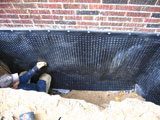Types of Sump Pumps to Defend Against a Leaky Basement
 When all else fails, one of the last lines of defense a homeowner can put up against a leaky basement is a tried and true device known as a sump pump. At its most basic level, think of a sump pump as an electric powered vacuum that can be submerged and is used to pump water from one area to another — in this case, your basement.
When all else fails, one of the last lines of defense a homeowner can put up against a leaky basement is a tried and true device known as a sump pump. At its most basic level, think of a sump pump as an electric powered vacuum that can be submerged and is used to pump water from one area to another — in this case, your basement.
In the case of a home or building constructed in an area with a high water table, a sump pump is often installed directly over a drain and automatically begins working whenever a sensor tells it water inside the drain has risen above a pre-determined height. The sump may also start working during heavy rains or when large amounts of snow have begun melting.
Types of Sump Pumps to Defend Against a Leaky Basement
There are three major types of sump pumps, including some that are stationary and others that are portable. Stationary are the kinds mentioned earlier that are installed directly over a drain, while the portable variety can be used just about anywhere you need to remove standing water either inside or outside a residence.
A pedestal sump pump includes an electrical motor positioned on the pump casing above the affected area and does not sit in the sump pit. It can be activated manually, or automatically based on time intervals or the presence of water. It is an ideal solution for a leaky basement, and is sometimes maintained by the water or building department in the community in which you live.
A submersible sump pump is a device that can be fully submerged in water and works the same basic way as a pedestal sump pump. Electric powered, it can be activated in different manners and is often portable in design. Besides its utility for a leaky basement, a submersible sump pump can also be used to drain water from a clogged sink, bath tub, toilet — or even siphon water off a pool cover in the spring.
The third kind is a water powered sump pump, which uses community water pressure to operate. During heavy rain or other times when city water pressure may increase, this type of sump pump automatically activates to keep water from flowing into your basement.
What to Watch Out For
A sump pump is not fool proof. If you notice that it is not preventing a leaky basement as you hoped, its usefulness could be affected by many factors. One cause of a sump pump not doing its job is because it is not large enough. Other reasons it may not function as expected include: if it has stopped working because of age or lack of maintenance, or has been taken offline due to a community power outage or electrical problem within your residence.
To make sure your sump pump is functioning properly, fill the sump pit with water to see if the pump starts working; follow manufacturer maintenance guidelines; and replace batteries as necessary. For more information, call us today at 416-651-2990. Visit us on Google+


